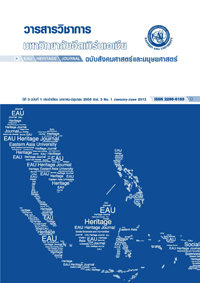รูปแบบการบริหารงานบุคคลในสถานศึกษาขั้นพื้นฐานที่เป็นนิติบุคคล ตามนโยบายการกระจายอำนาจในจังหวัดชายแดนด้านตะวันออก
Keywords:
สถานศึกษาขั้นพื้นฐาน, การบรหารงานบุคคล, นิติบุคคล, basic education, personnel administration model, decentralization policyAbstract
การวิจัยมีวัตถุประสงค์เพื่อ (1) ศึกษาสภาพปัจจุบัน (2) พัฒนารูปแบบและ (3) ตรวจสอบผลการใช้ รูปแบบการบริหารงานบุคคลในสถานศึกษาขั้นพื้นฐานที่เป็นนิติบุคคลตาม นโยบายการกระจายอำนาจใน จังหวัดชายแดนด้านตะวันออก เป็นการวิจัยแบบผสม คือ ใช้การสัมภาษณ์ การสัมมนากลุ่มย่อยและแบบสอบถาม ได้แก่ (1) กลุ่มผู้บริหารโรงเรียน (2) กลุ่มคณะกรรมการสถานศึกษาขั้นพื้นฐาน (3) กลุ่มครูผู้สอนในจังหวัดชายแดน ด้านตะวันออก สังกัดสำนักงานคณะกรรมการการศึกษาขั้นพื้นฐาน โดยการสุ่มแบบแบ่งชั้น จากจำนวนโรงเรียน 592 โรงเรียน จาก 3 จังหวัด โดยกลุ่มตัวอย่าง 310 โรงเรียน สถิติที่ใช้ในส่วนของงานวิจัยเชิงปริมาณ คือค่าเฉลี่ย ความเบี่ยงเบนมาตรฐาน และค่าร้อยละ ผลการวิจัยพบว่า (1) สภาพปัจจุบันพบว่า ในการบริหารจัดการแต่เดิม การตัดสินใจจะทำโดยผู้บริหารแต่เพียงลำพัง ในปัจจุบันเมื่อได้มีนโยบายการกระจายอำนาจ บุคลากรได้เข้ามามี ส่วนร่วมในการบริหารและการตัดสินใจมากขึ้น จากการสัมภาษณ์ และแบบสอบถามพบว่าการมีส่วนร่วมของ บุคลากรยังอยู่ในระดับน้อย ส่วนรูปแบบการบริหารงานบุคคล ค้นพบจากข้อมูลใน ประกอบด้วย 10 ด้านดังนี้ (1) บุคคล (2) การบริหารด้านสิ่งแวดล้อม (3) การพัฒนางานวิชาการ (4) งบประมาณ (5) การพัฒนางานทั่วไป (6) การวางแผน (7) การสรรหาและเลือกสรรบุคลากร (8) การประเมินและพัฒนาบุคลากร (9) ด้านวินัย และ (10) การสร้างขวัญและกำลังใจ ซึ่งผลการใช้รูปแบบการบริหารงานบุคคลในสถานศึกษาขั้นพื้นฐานที่เป็นนิติบุคคล ตามนโยบายการกระจายอำนาจในจังหวัดชายแดนด้านตะวันออกโดยรวมอยู่ในระดับมาก
A Personnel Administration Model for the Juristic Basic Education Institute under the Decentralization Policy in the Bordered Provinces of Eastern Thailand
This dissertation designed for the current situation aimed at developing a model and at evaluating the results of operating developmental personnel management in basic education institutions under the decentralization policy in the eastern border provinces. Mixed methods were used in the research namely interviews, focus group discussion and structured questionnaire with school executives and committee members of basic education institutions. The subject of the study was a stratified sample of 310 out of 592 schools in the three eastern border provinces. The statistical methods used to analyze the data were mean, standard deviation, and percentage. The study revealed the need for inreased participation of staff members in human resource and personnel management as administrative board members for managing and decision making which, currently, was found at low level. The personnel management model basically consisted of 10 structural perspectives namely personnel management, environmental management, academic development collaboration, budget development collaboration, general management development collaboration, man power planning collaboration, personnel recruitment and selection collaboration, personnel evaluation and development, discipline and resignation, and morale and encouragement. The developmental personnel management model basically was at high level.




